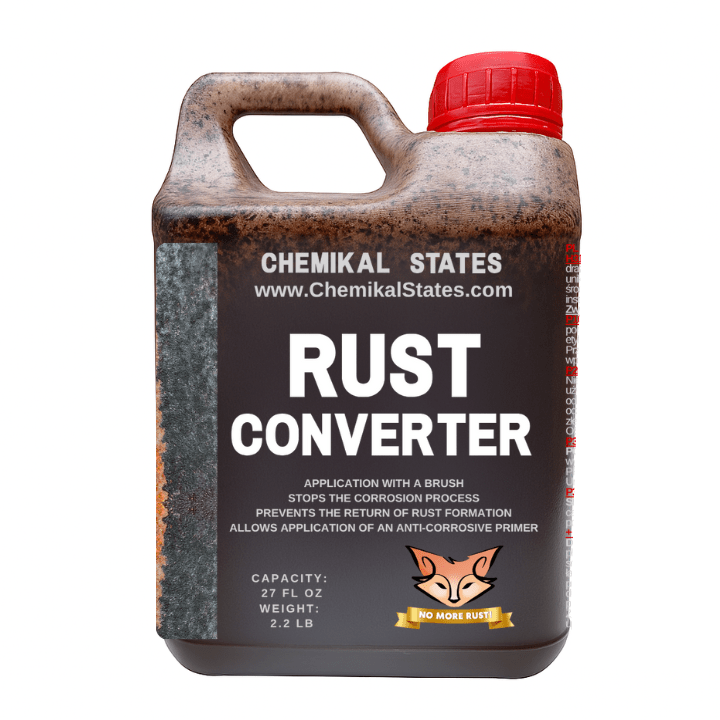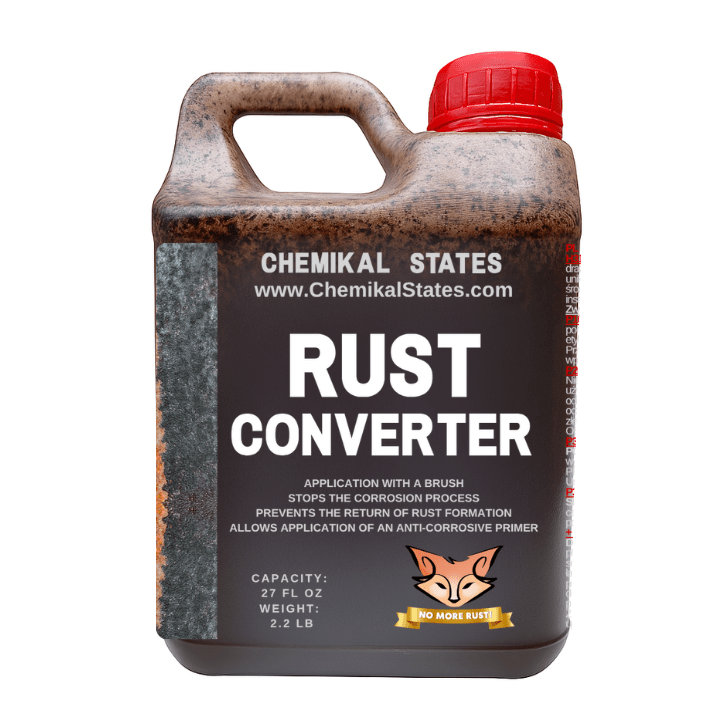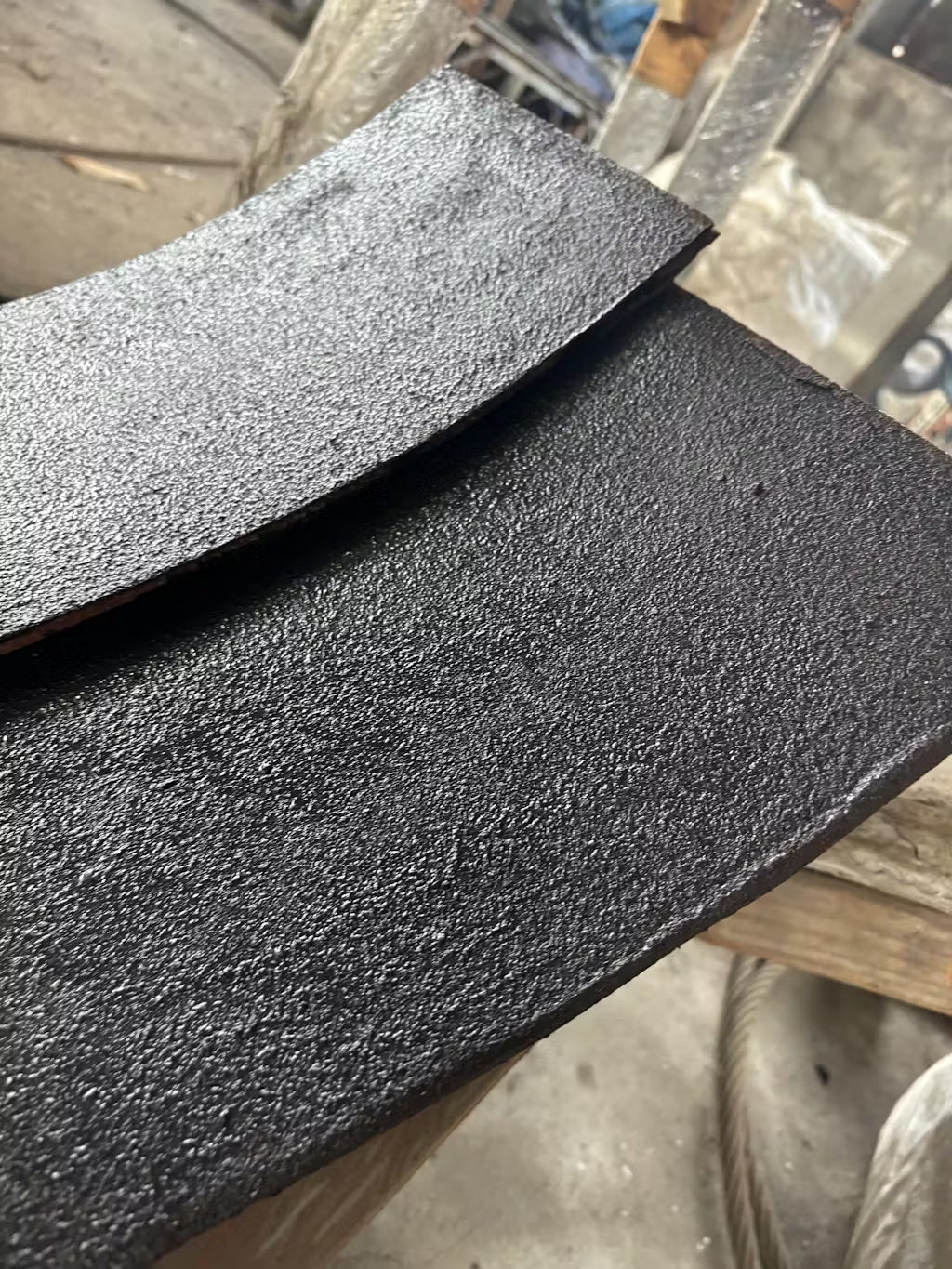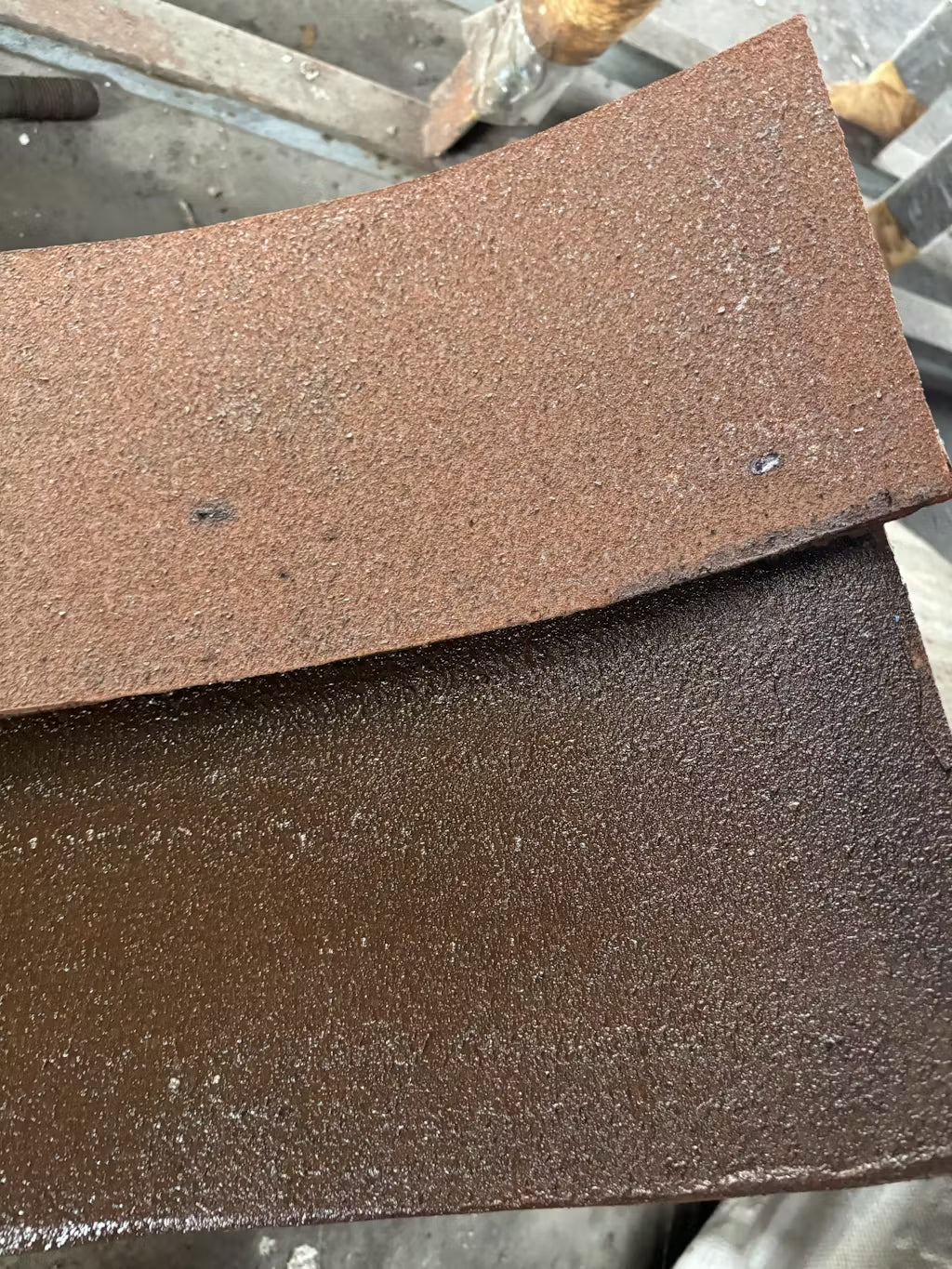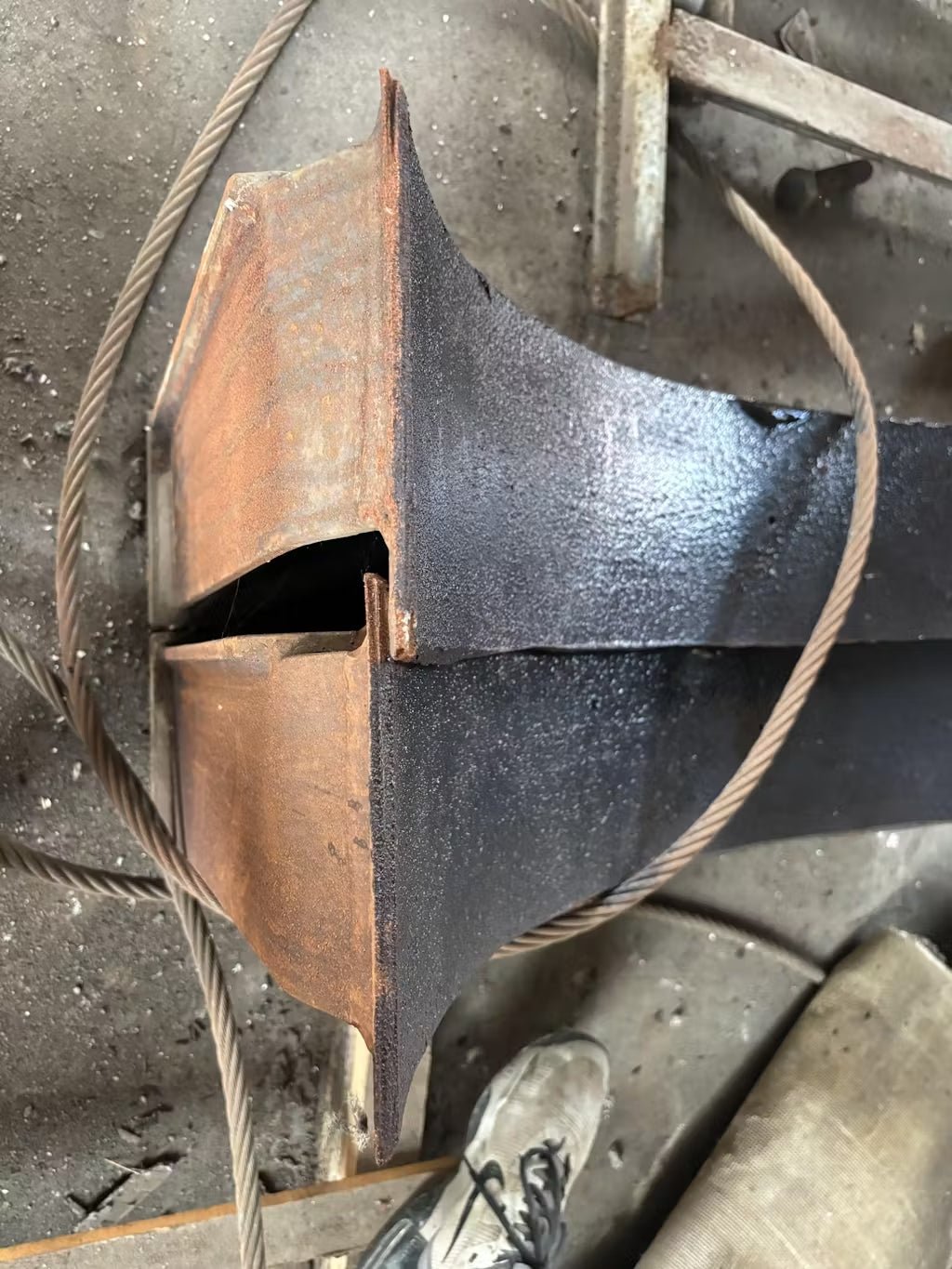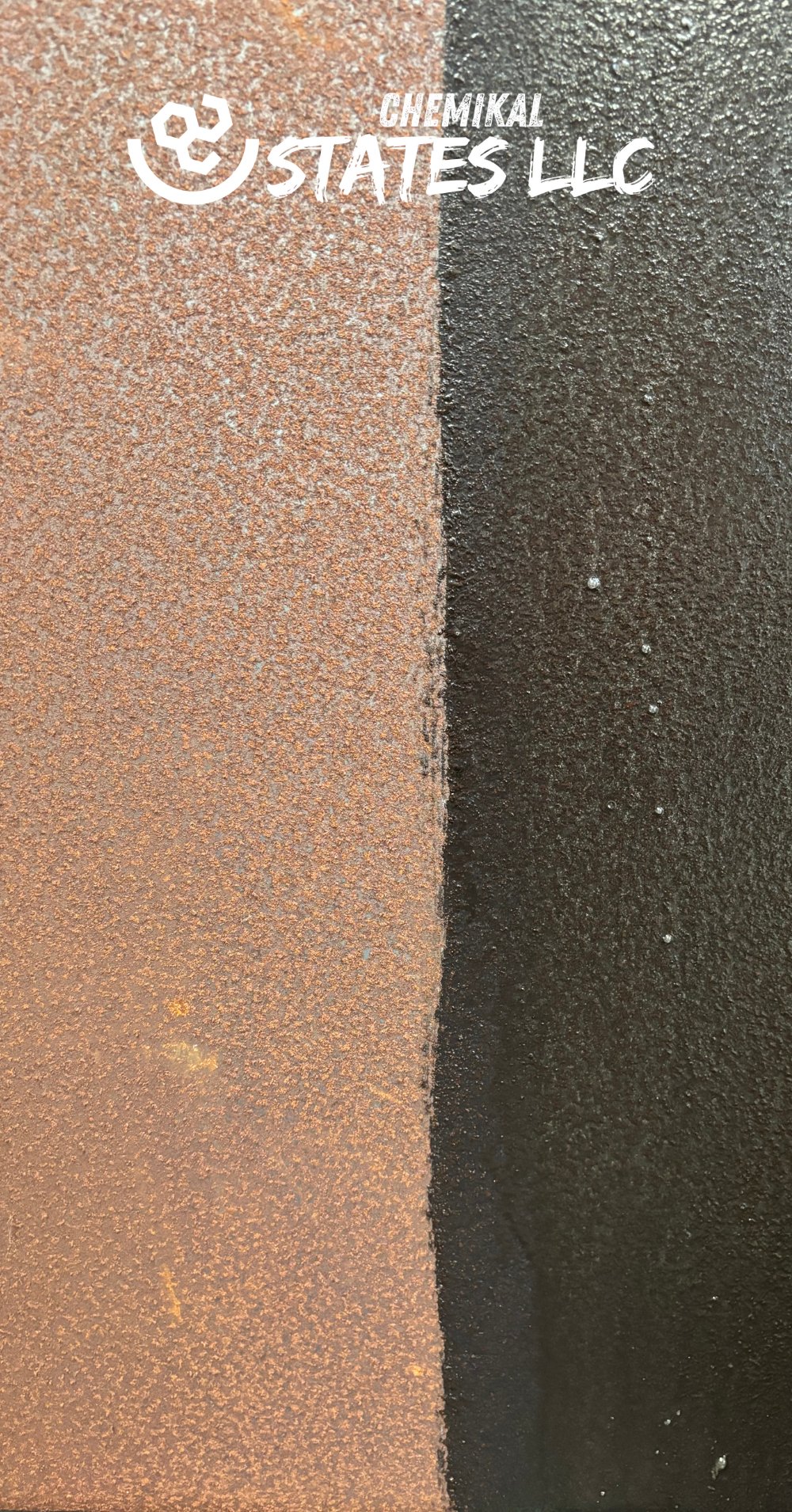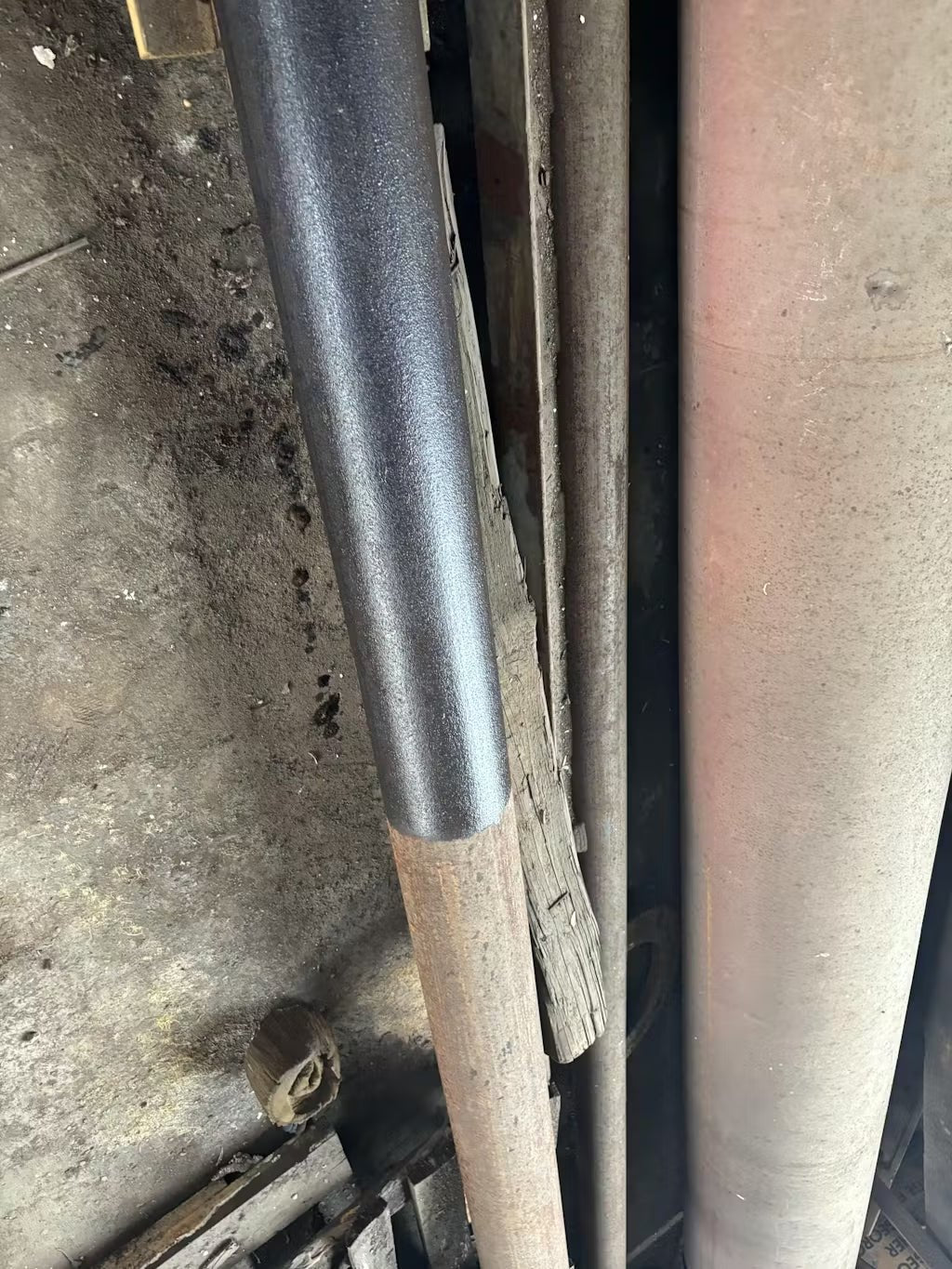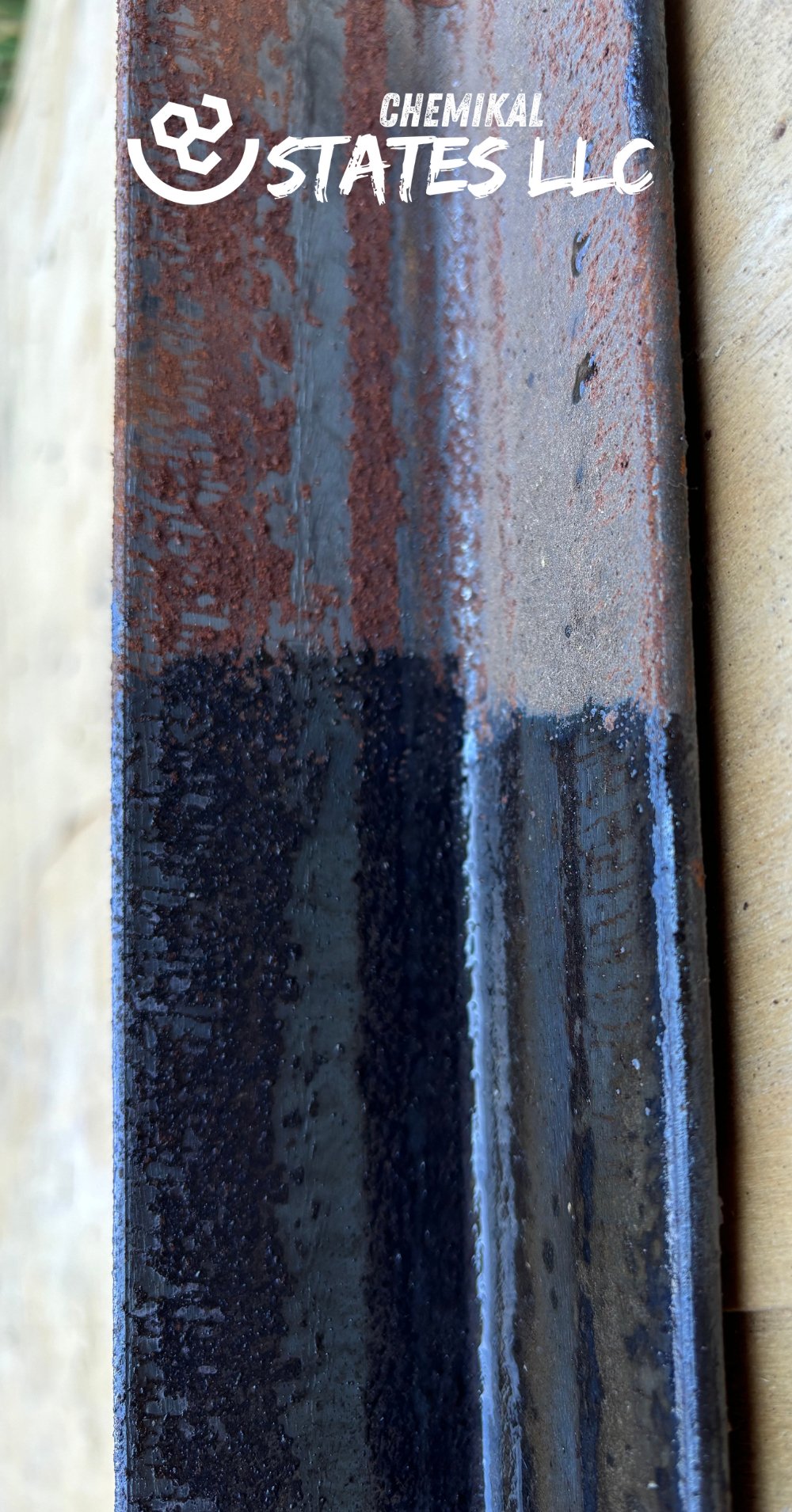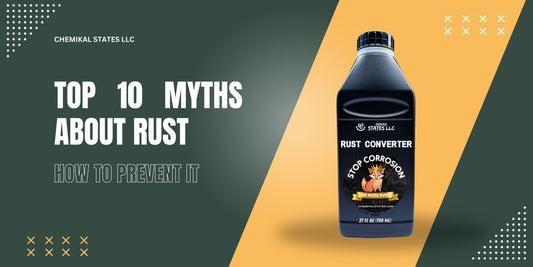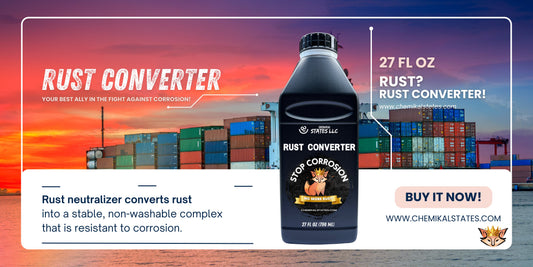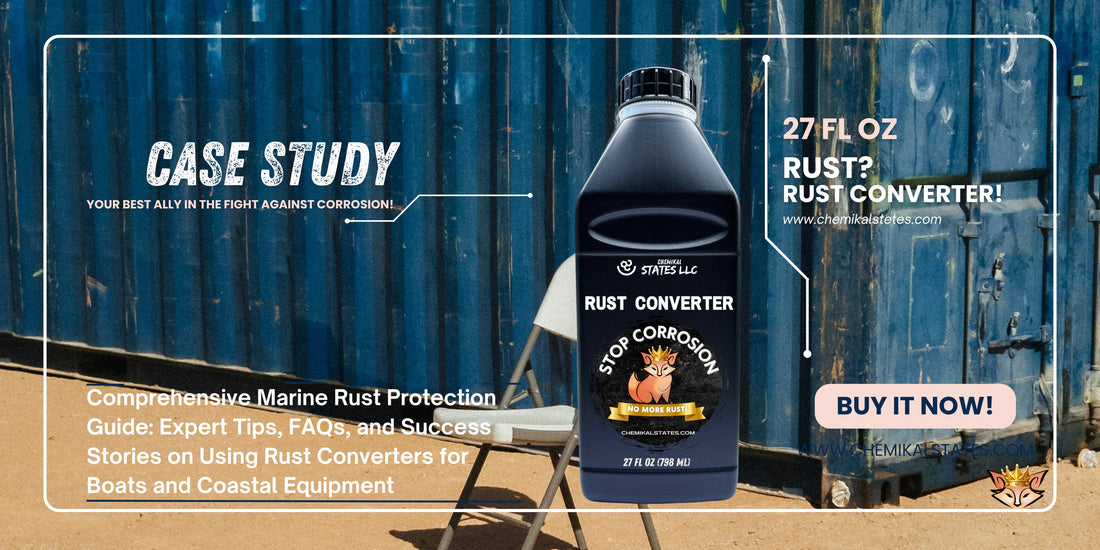
Marine Rust Protection: How to Use Rust Converters for Boats and Coastal Equipment
Share
Rust is a constant threat to boats and coastal equipment, especially in harsh marine environments where saltwater, humidity, and exposure to the elements accelerate the corrosion process. Protecting your valuable assets from rust is not only crucial for maintaining their appearance but also for ensuring their longevity and safety. In this detailed guide, we'll explore the best practices for using rust converters to protect your boats and coastal equipment, helping you keep them in top condition for years to come.
Why Rust is a Major Problem in Marine Environments
Marine environments are notoriously harsh on metal surfaces due to the presence of saltwater and high humidity levels. Salt acts as a catalyst, speeding up the oxidation process and causing rust to form much faster than in non-coastal areas. Once rust starts, it can spread quickly, leading to structural weaknesses, unsightly damage, and ultimately costly repairs or replacements.
What is a Rust Converter and How Does It Work?
A rust converter is a chemical solution that reacts with iron oxide (rust) to convert it into a stable, black polymer. This polymer seals the rusted area, preventing further oxidation and providing a protective layer that can be painted over. Rust converters are especially useful in marine environments because they allow you to treat rusted areas without the need for extensive sanding or grinding, which can be time-consuming and challenging on large surfaces.
Choosing the Right Rust Converter for Marine Applications
When selecting a rust converter for marine use, it's important to choose a product that is specifically formulated to withstand the rigors of a saltwater environment. Look for rust converters that offer the following features:
- Saltwater Resistance: Ensure the product is designed to hold up against constant exposure to saltwater.
- Durability: Choose a rust converter that provides a durable, long-lasting finish capable of withstanding harsh marine conditions.
- Compatibility: The product should be compatible with the types of metal used in your boat or equipment, whether it’s steel, iron, or aluminum.
- Ease of Application: Consider how easy it is to apply the rust converter, especially in hard-to-reach areas or on large surfaces.
One excellent option to consider is the Chemikal States Rust Converter, which is formulated to provide robust protection in marine environments.
Step-by-Step Guide to Using Rust Converters on Boats and Coastal Equipment
1. Prepare the Surface:
- Start by cleaning the rusted area to remove loose rust, dirt, salt, and any other debris. Use a wire brush or sandpaper to lightly scuff the surface, but there’s no need to remove all the rust down to bare metal—just focus on removing the flaky, loose rust.
- Rinse the area thoroughly with fresh water to remove any salt residue and let it dry completely before proceeding.
2. Apply the Rust Converter:
- Shake the rust converter bottle well before use. Depending on the size of the area, you can apply the converter using a brush, roller, or spray.
- Apply a generous coat of rust converter evenly across the rusted area. Ensure full coverage, especially in crevices and hard-to-reach spots.
- Allow the rust converter to dry completely. Drying times can vary, but it usually takes about 30 minutes to an hour, depending on temperature and humidity.
3. Apply a Second Coat (If Necessary):
- For heavily rusted areas or surfaces that are constantly exposed to saltwater, apply a second coat after the first has dried. This will ensure maximum protection and coverage.
4. Finish with a Protective Coating:
- Once the rust converter has fully cured, consider applying a marine-grade primer and topcoat for additional protection. This step is especially important for parts that are frequently submerged or exposed to harsh conditions.
- Choose a paint that is designed for marine use and provides UV protection to prevent fading and further damage from the sun.
5. Regular Maintenance:
- Inspect treated areas regularly, especially after heavy use or exposure to saltwater. If you notice any new rust spots, address them immediately to prevent further spread.
- Rinse your boat or equipment with fresh water after each use to remove salt deposits, which can accelerate rust formation.
Real-World Examples: Successful Rust Protection in Marine Environments
To see how effective rust converters can be in marine environments, check out our detailed case study on how the Chemikal States Rust Converter was used to protect industrial sheet metal for a leading German client operating in coastal regions. The results speak for themselves—rust was not only halted but the treated surfaces were also restored to a durable, rust-resistant state.
Frequently Asked Questions About Marine Rust Protection
For more information on using rust converters in marine environments, visit our FAQ page. We cover common questions, such as how to store rust converters, the best practices for application, and how to maintain rust-free surfaces over time.
Conclusion: Protect Your Investment with the Right Rust Converter
Rust can wreak havoc on boats and coastal equipment, but with the right rust converter, you can effectively stop corrosion and protect your investments. The Chemikal States Rust Converter offers a powerful solution that’s easy to use and designed to withstand the challenges of marine environments. Don’t wait until rust becomes a serious problem—take action now and keep your equipment in pristine condition.
Ready to get started? Visit our product page and order your rust converter today. Protect your assets, extend their life, and enjoy the peace of mind that comes with knowing your equipment is safe from rust.
FAQ: Marine Rust Protection with Rust Converters
1. What is a rust converter?
A rust converter is a chemical solution that reacts with rust (iron oxide) to convert it into a stable, protective polymer. This prevents further corrosion and prepares the surface for painting or other protective coatings.
2. How does a rust converter work?
Rust converters work by chemically transforming rust into a non-reactive, black polymer that seals the rusted area and stops the oxidation process, preventing further corrosion.
3. Can I use a rust converter on my boat?
Yes, rust converters are highly effective for protecting metal surfaces on boats, particularly in harsh marine environments where saltwater exposure accelerates rust formation.
4. Is the Chemikal States Rust Converter suitable for marine use?
Yes, the Chemikal States Rust Converter is formulated to provide robust protection against rust in marine environments, making it ideal for boats and coastal equipment.
5. Do I need to remove all rust before applying a rust converter?
No, you don’t need to remove all rust. Simply remove any loose, flaky rust and clean the surface. The rust converter will react with the remaining rust to stabilize it.
6. How do I apply a rust converter?
You can apply a rust converter using a brush, roller, or spray. Ensure the surface is clean and dry before application, and apply an even coat over the rusted area.
7. How long does it take for the rust converter to dry?
The drying time for a rust converter typically ranges from 30 minutes to an hour, depending on the environmental conditions such as temperature and humidity.
8. Can I paint over the rust converter?
Yes, once the rust converter has fully cured, you can paint over it with a marine-grade primer and topcoat for additional protection.
9. Is a second coat of rust converter necessary?
For heavily rusted areas or surfaces exposed to extreme conditions, applying a second coat is recommended to ensure maximum protection.
10. How do I prepare the surface before applying a rust converter?
Clean the surface to remove loose rust, dirt, and debris. Lightly sand the area if needed, but full rust removal is not required. Ensure the surface is dry before applying the rust converter.
11. Is the Chemikal States Rust Converter eco-friendly?
Yes, the Chemikal States Rust Converter is free from harmful chemicals and is safe for both you and the environment.
12. Can I use a rust converter on aluminum?
Rust converters are designed for use on iron and steel. Aluminum does not rust in the same way, so rust converters are not effective on aluminum surfaces.
13. Will a rust converter protect my boat from saltwater corrosion?
Yes, a rust converter will protect metal surfaces from saltwater corrosion by stabilizing existing rust and preventing further oxidation.
14. Can I use a rust converter on galvanized metal?
Rust converters are generally not recommended for galvanized metal because the zinc coating on galvanized metal is designed to prevent rust.
15. How long does the protection from a rust converter last?
The protection from a rust converter can last for several years, especially when combined with a protective topcoat and regular maintenance.
16. Do I need any special tools to apply a rust converter?
No special tools are required. You can apply the rust converter with a brush, roller, or spray bottle, depending on the size of the area you are treating.
17. Can I use a rust converter on my trailer?
Yes, rust converters are effective for treating rust on trailers, especially those exposed to saltwater or wet conditions.
18. How should I store my rust converter?
Store your rust converter in a cool, dry place, away from direct sunlight. Ensure the container is tightly sealed when not in use.
19. Is it safe to use a rust converter indoors?
Yes, rust converters can be used indoors, but ensure the area is well-ventilated during application.
20. What should I do if the rust converter comes into contact with my skin?
If the rust converter comes into contact with your skin, wash the area thoroughly with soap and water. Consult the product’s safety instructions for further guidance.
21. Can I use a rust converter on painted surfaces?
Rust converters are intended for use on rusted, bare metal surfaces. If the surface is already painted, remove the paint in the rusted area before applying the converter.
22. Will a rust converter work in cold weather?
Rust converters are most effective when applied in moderate temperatures. If applying in cold weather, ensure the surface is dry and the temperature is above the product's minimum application temperature.
23. Can I use a rust converter on stainless steel?
Rust converters are not designed for stainless steel, as stainless steel resists rust differently from regular steel. They are most effective on iron and steel surfaces.
24. Do rust converters work on underwater surfaces?
Rust converters should be applied to dry surfaces. If the surface will be submerged after treatment, ensure the converter has fully cured and is protected with an appropriate topcoat.
25. Can I use a rust converter on cast iron?
Yes, rust converters work well on cast iron, which is prone to rusting, especially in marine environments.
26. How often should I inspect treated areas for new rust?
Regularly inspect treated areas, especially after exposure to saltwater or heavy use. Address any new rust spots immediately to prevent further spread.
27. Is the Chemikal States Rust Converter compatible with all paints?
The Chemikal States Rust Converter is compatible with most marine-grade primers and topcoats. Always test a small area first if you are unsure.
28. How much rust converter do I need for my boat?
The amount needed depends on the size of the rusted area. Refer to the product’s coverage guidelines, usually measured in square feet per gallon.
29. What are the benefits of using a rust converter over other rust removal methods?
Rust converters are easier to use, less labor-intensive, and provide long-term protection by converting rust into a protective layer rather than just removing it.
30. Can I apply a rust converter over previously treated areas?
Yes, you can reapply a rust converter over previously treated areas if new rust has appeared or if additional protection is needed.
Common Mistakes to Avoid When Using Rust Converters on Boats
31. Can I apply a rust converter on a dirty surface?
No, always clean the surface thoroughly before applying a rust converter. Dirt, oil, and grease can prevent the converter from properly adhering to the rusted area, reducing its effectiveness.
32. What happens if I don’t apply a protective topcoat after using a rust converter?
If you don’t apply a protective topcoat, the treated area may still be vulnerable to future corrosion, especially in harsh marine environments. Always seal the treated surface with a suitable marine-grade paint.
How to Choose the Best Marine-Grade Topcoat After Using a Rust Converter
33. What type of paint should I use after applying a rust converter?
Choose a high-quality, marine-grade topcoat that offers UV protection, saltwater resistance, and durability. This will provide long-lasting protection and enhance the appearance of your treated surfaces.
34. Can I use epoxy paint over a rust converter?
Yes, epoxy paints are an excellent choice for covering areas treated with a rust converter, especially in marine environments. They provide a tough, protective barrier that resists water and chemical exposure.
Long-Term Maintenance Tips for Rust-Free Boats and Coastal Equipment
35. How often should I inspect my boat for rust after treatment?
Regular inspections are key to maintaining a rust-free boat. Check your boat at least once a season, or more frequently if it’s used in particularly harsh conditions, to catch and treat any new rust spots early.
36. Can regular washing prevent rust on my boat?
Yes, rinsing your boat with fresh water after each use, especially after exposure to saltwater, can help prevent the buildup of salt deposits that accelerate rust formation.
The Science Behind Rust Converters: Understanding the Chemical Process
37. What chemical reactions occur when a rust converter is applied?
Rust converters typically use tannic acid or phosphoric acid to react with iron oxide (rust) and convert it into a more stable compound, such as ferric tannate or iron phosphate. This forms a protective layer that seals the surface and prevents further oxidation.
38. Why is it important to understand the chemical process behind rust converters?
Understanding the chemical process helps ensure that you use the product correctly and appreciate its benefits. It also allows you to choose the right product for specific applications, ensuring maximum effectiveness.
Real-Life Examples of Rust Converter Success Stories in Marine Applications
39. How have other boat owners benefited from using rust converters?
Many boat owners have successfully extended the life of their vessels by using rust converters. For instance, in one case study, a commercial fishing boat exposed to constant saltwater spray remained rust-free for several seasons after treatment.
40. Can rust converters be used on large commercial ships?
Yes, rust converters are effective on large commercial ships, especially in areas that are difficult to reach or regularly exposed to harsh marine conditions. Proper application and maintenance can significantly reduce corrosion-related maintenance costs.
Advanced Tips for Maximizing the Effectiveness of Rust Converters
41. How can I ensure complete coverage when applying a rust converter?
Use a spray application for large or complex surfaces to ensure even coverage. For small areas, a brush can help work the converter into crevices and tight spots.
42. What additional treatments can be used alongside rust converters for extra protection?
In addition to rust converters, consider applying anti-corrosive primers and zinc-rich coatings for maximum protection in highly corrosive environments.
Eco-Friendly Marine Rust Protection: Sustainable Practices for Boat Owners
43. What makes a rust converter eco-friendly?
Eco-friendly rust converters are made with non-toxic, biodegradable ingredients that don’t harm marine life or contribute to water pollution. Choosing such products helps protect both your boat and the environment.
44. Can I safely dispose of leftover rust converter?
Yes, most eco-friendly rust converters can be disposed of safely according to local regulations. Always follow the manufacturer’s instructions for disposal to ensure compliance with environmental guidelines.
The Impact of Rust Converters on Boat Resale Value
45. How does using a rust converter affect the resale value of my boat?
Properly treating and protecting your boat with a rust converter can significantly enhance its resale value by preserving its structural integrity and appearance. Buyers are more likely to pay a premium for well-maintained, rust-free vessels.
46. Is it worth mentioning rust treatment when selling my boat?
Absolutely. Highlighting that your boat has been treated with a high-quality rust converter and maintained with regular anti-corrosive measures can be a strong selling point for potential buyers.

